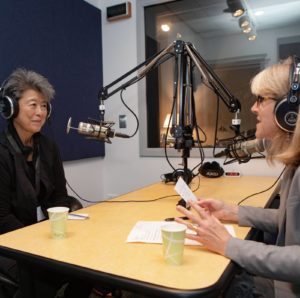
When we think of research, we tend to picture someone sitting in the library surrounded by stacks of books. While it’s true that books (and textual materials accessed via the web) remain incredibly important to the research process, not everything research-worthy comes in book form. Indeed, for certain types of research, such as ethnography, journalism, and oral history, going out into the broader world outside the library doors is essential. This was the case for me recently as I worked on a podcast for a History of Science class; an interview with a molecular biology professor about their work on the Human Genome Project was central to my endeavor. So, in light of this recent experience and in the spirit of diversifying the types of sources we use as researchers, I will share in this post some thoughts on how to incorporate an interview into a class project or research paper.
First, assess your project to make sure that an interview is appropriate and/or feasible. (Check out my fellow PCUR Taylor’s interview-related post, which discusses the potential necessity of IRB approval for human subject research.) There are some projects and assignments that ask you to engage with specific types of source material (primary, secondary, course readings only, etc.). Obviously, it would be both unnecessary and perhaps unwise to include an interview where one has not been requested. On the flip side, if you’re unsure whether your project could benefit from an interview as a source, ask your professor! I predict that they will appreciate your interest and initiative.
Once you’ve established that you want to (and defensibly can!) include an interview in your project, you’ll have to decide who you want to interview. Here, I would recommend keeping an open mind and your options open, because your first request (or even your first few) may not elicit a response. Don’t despair; if someone is an expert on or active participant in something important, they’re probably bombarded with lots of emails and requests. As such, the same rules as for contacting faculty apply: be patient, yet persistent. Follow up emails are quite alright—essential, perhaps—but don’t cross the line into rudeness or serious annoyance. (Go with your gut, and you’ll probably stop yourself well short of such unpleasantries.)
Once the interview is set, you can start doing some more serious homework on your interviewee. Then, you can begin to think about what you want to ask them. How does their expertise or life experience relate to your project? What perspective do you believe they hold on your topic, and what kinds of questions would best capture that perspective?
During the actual interview itself, my main advice is to listen to your interviewee as much as possible. It’s their voice you want to hear, after all! As I found during a recent interview with a molecular biology professor for a History of Science project, focusing on listening makes it easier to isolate quotes for an audio presentation (a podcast, in my case). Also in this vein, make an effort to not ask leading questions (i.e., those that point toward one or relatively few answers). Try not to shower your interviewee with praise or criticism after each answer. (But also, be aware that more subtle gestures like body language and even facial expressions can have similar effects to the blunter practice just described.)
If you record your interview—and make sure you obtain permission before you do—then you might not need to take notes in real time. But, after it’s over, I would recommend that you jot down initial impressions/takeaways on what the interview can add to your project. Over the next few days/weeks, listen to the interview again (and again after that, if need be) with “fresh ears” in order to make sure that you’ve mentally digested everything. One helpful strategy: as you listen, write down time data corresponding to your notes so that you can easily find/listen to a particular quote again.
Adding an interview to your project is an interesting way to spice up your research and to go beyond the books, as it were. In addition to directly enhancing your project, an interview might even alert you to other sources or interview-worthy people and thereby take you forward in your research journey. Before you leave the PCUR site, I would also recommend taking a look at a recent post by Andrea featuring more interview tips. So, should you elect to conduct an interview, I hope that our various thoughts on the matter prove useful!
–Shanon FitzGerald, Social Sciences Correspondent

